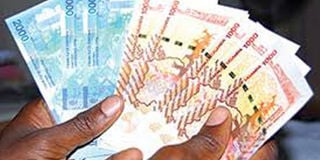Government sponsored students to earn Shs1.7m allowances

What you need to know:
• Each student current gets Shs936, 000 each academic year
• Ministry proposes this is increased to Shs1.6 million annually
Kampala
Mbarara University of Science and Technology’s government–sponsored students’ living out allowance will be increased by Shs3, 000 if Parliament okays an Education ministry proposal.
The proposal, which is in the Education ministry’s FY2017/18 Ministerial Policy Statement, suggests the allowance is increased from Shs4, 000 to Shs7, 000 per day to enable the students to afford at least two square meals a day.
The proposal, which is in the Education ministry’s FY2017/18 Ministerial Policy Statement, is meant to enable the students afford at least two square meals a day.
Should Parliament support it, by appropriating the money, 454 MUST students will from July 1, 2017 be receiving it.
The 454 are the government–sponsored students who, due to space constraints, do not reside within the university’s precincts or halls, where meals would be on the house.
They reside in affiliated hostels, many of which do not have cafeteria services.
Last year, MUST students went on strike over the low living out allowance.
Speaking to the matter last year, MUST said the students allowance was indeed low.
He said the university would figure out by what amount to it.
The living out allowance varies with university.
To arrive at it, the cost of living in the areas where the universities are located is taken into consideration.
Makerere University gives Shs1.4 million annually (Shs5, 982 per day for 234 days) to each government–sponsored student that is not accommodated on campus.
On the other hand, Kyambogo University gives each government–sponsored student Shs960, 000 per annum (Shs4, 101 per day).
In November, the university said it would look into increasing its students living out allowances.
This was after the government–sponsored students asked for an increase, arguing that the Shs960, 000 per academic year is insufficient to cater for their needs.
To illustrate how little the money was, they had even refused to take it, saying they could wait until the university increases it.
The university later persuaded them to accept what it was giving them.
It said that if they refused to accept what they were getting, many students who had no alternative sources of income would be hit hard.
Kyambogo University is yet to come up with a new rate for the students.
Revising the rates of students’ allowances has to be approved by the university Council, which process may take a little more time, Kyambogo University said in a notice to the students.
Whatever the amount the universities should give the government–sponsored students, many times the government often delays to release the money.
And when it eventually releases it, it does it in installments.
For instance, last year, though the government was supposed to release Shs424.9 million for MUST’s students, it only gave the university Shs221.9 million for MUST’s living out allowances.




